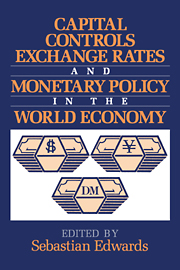Book contents
- Frontmatter
- Contents
- List of contributors
- Introduction
- Part I Monetary policy and stabilization in open economies
- Part II Capital mobility and macroeconomic policy in Europe
- Part III Capital controls and macroeconomic policy in the Asia-Pacific region
- 8 Capital movements, real asset speculation, and macroeconomic adjustment in Korea
- 9 The determinants of capital controls and their effects on trade balance during the period of capital market liberalization in Japan
- 10 Capital mobility and economic policy
- 11 Monetary and exchange rate policies 1973–1991: the Australian and New Zealand experience
- Part IV Capital mobility and exchange rates in Latin America
- Index
8 - Capital movements, real asset speculation, and macroeconomic adjustment in Korea
Published online by Cambridge University Press: 16 October 2009
- Frontmatter
- Contents
- List of contributors
- Introduction
- Part I Monetary policy and stabilization in open economies
- Part II Capital mobility and macroeconomic policy in Europe
- Part III Capital controls and macroeconomic policy in the Asia-Pacific region
- 8 Capital movements, real asset speculation, and macroeconomic adjustment in Korea
- 9 The determinants of capital controls and their effects on trade balance during the period of capital market liberalization in Japan
- 10 Capital mobility and economic policy
- 11 Monetary and exchange rate policies 1973–1991: the Australian and New Zealand experience
- Part IV Capital mobility and exchange rates in Latin America
- Index
Summary
Introduction
Domestic financial deregulation and capital account liberalization in advanced countries have contributed to a greater mobility of capital and financial integration of these economies for the past two decades. In contrast, however, developing countries have been slow and reluctant to remove various restrictions on international capital flows for fear that such a policy could undermine macroeconomic stability and weaken autonomy in the conduct of monetary and exchange rate policy. In this respect Korea is not an exception.
Although Korea has been under strong pressures to liberalize its financial markets and capital movements by its major trading partners, including the United States, the Korean monetary authorities have maintained the position that capital market liberalization should be sequenced to stable macroeconomic conditions characterized by a strong or balanced current account, stable prices, and domestic interest rates. But the freemarket advocates see it differently, arguing that if capital market deregulation is not carried out, the preconditions for macroeconomic stability will never be met. The debate between the two sides continues to this day.
Korea had maintained a system of extensive capital control until the early 1980s. Since then it has implemented an overall plan for economic liberalization. As a result, many argue that Korea has already achieved a great deal in loosening up the restrictions on capital movements (see Nam 1992). Recent studies, however, challenge this view by showing that the capital account remains as closed as it has ever been (Reisen and Yeches 1991).
- Type
- Chapter
- Information
- Publisher: Cambridge University PressPrint publication year: 1995



